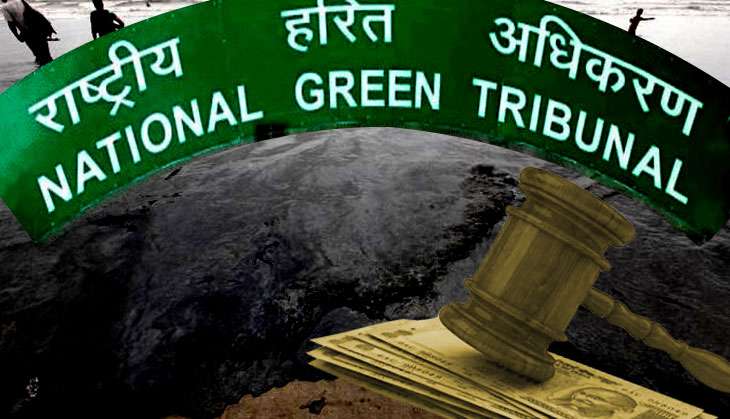Marine pollution: NGT fines Qatari shipping firm Rs 100 crore, Adani Rs 5 crore

Cracking the whip on Delta International for causing marine pollution after its ship sank off Mumbai in 2011, the National Green Tribunal has fined the Qatar-based shipping company Rs 100 crore fine.
The ship sank with over 60,000 tonnes of coal it was carrying for Adani Enterprises. Adani was fined Rs 5 crore.
The NGT also ordered an expert committee to find out if the ship and its cargo can be recovered. If not, the NGT will impose further fine that Delta and Adani will have to pay regularly.
Also Read: 6 Adani firms, ADAG, under scanner in coal over-invoicing scam, reports EPW
The NGT Act empowers the tribunal to impose environment compensation on those it finds guilty of damaging the environment. This is known as the "polluter pays principle".
In this case, the NGT also invoked the "principle of strict liability" after finding that the ship was running in a poor condition. "Respondents are defaulting entities which have not complied with law and have adopted a most careless and reckless attitude in relation to protecting the marine environment," the judgment pronounced on 23 August by the NGT's principal bench read. The 4-member bench is headed by NGT chairperson Justice Swatanter Kumar.
MV Rak was registered in Panama but owned by Delta International, a Qatari company. It sank 20 nautical miles or 37 km off Mumbai's coast on 4 August 2011. Apart from coal, it was carrying 290 tonnes of fuel oil and 50 tonnes of diesel.
The sunken ship leaked about eight tonnes of oil per day, causing a spill that spread over 22 km affecting Mumbai and the Raigad district of Maharashtra. The spill was "very thick" for 2 km and "thick" for 4 km.
The NGT held that the oil spill damaged mangroves in Mumbai, in particular blackening the mangroves of Bandra.
Adani primarily liable
The ship was sailing from Indonesia to deliver coal at Adani's port in Dahej. Although Adani Enterprises argued that it was not responsible for the ship's sinking, the NGT held that since the company owned the coal it was liable for the pollution caused by it under the sea.
"It is in fact strange that [Adani Enterprises] being the owner of the consignment cargo made no efforts to remove the cargo... [Adani] is liable for cargo pollution and has completely failed in taking any preventive and precautionary measures to prevent the pollution resulting from the coal," the tribunal ruled.
Accordingly, Adani was held "primarily liable" for the damage to marine environment along with the shipping company.
The NGT found the shipping company had ignored several calls for repair from the ship. The ship began facing mechanical problems within weeks of setting sail from Indonesia in June 2011, after water started entering its bunkers.
On 5 July, the ship's captain asked for a heavy duty submersible pump but the company did not send it. The ship anchored off Mumbai on 19 July, awaiting supplies and repair of its generator. Because of water in cargo compartments, the ship was tilted towards the left, leaving it exposed to pounding waves that hit so hard the fuel oil filling pipe broke.
Also Read: No end to Adani's Australian nightmare: CEO accused of poisoning a river
As things got worse, the captain called authorities at the Mumbai port for help, prompting the Director General, Shipping, to order an inspection just hours before the ship eventually sank. The report confirmed that the ship was in poor shape and its maintenance was below standards. During its voyage, it also faced frequent blackouts and engine stoppages.
In its judgment, the NGT referred to Sterlite Industries vs Union of India, in which the Supreme Court applied the principle of strict liability to impose a Rs 100 crore penalty without computing the exact costs.
The NGT also formed an 8-member committee, led by Additional Secretary, Ministry of Shipping, and consisting of coast guard officials and scientists, to determine within 30 days whether the ship and its coal cargo can be removed from the sea.
If the committee finds it best for the ship to remain sunk, then a recurring fine will be imposed on the shipping company and Adani for controlling pollution from the wreckage.
This is not the first time the NGT has imposed such a hefty fine. In 2015, it had ordered civic bodies in Mumbai to cough up Rs 100 crore for neglecting the continuing pollution of rivers in the city.
Also Read: Between the lines: NGT didn't stop #AOL event, but there's more to its order
First published: 23 August 2016, 11:28 IST





_251021_300x172.jpg)
![BJP's Kapil Mishra recreates Shankar Mahadevan’s ‘Breathless’ song to highlight Delhi pollution [WATCH] BJP's Kapil Mishra recreates Shankar Mahadevan’s ‘Breathless’ song to highlight Delhi pollution [WATCH]](http://images.catchnews.com/upload/2022/11/03/kapil-mishra_240884_300x172.png)

![Anupam Kher shares pictures of his toned body on 67th birthday [MUST SEE] Anupam Kher shares pictures of his toned body on 67th birthday [MUST SEE]](http://images.catchnews.com/upload/2022/03/07/Anupam_kher_231145_300x172.jpg)






